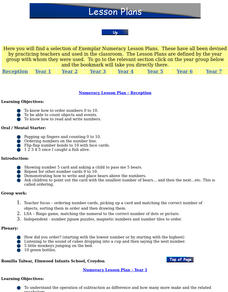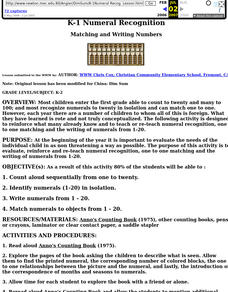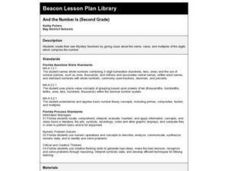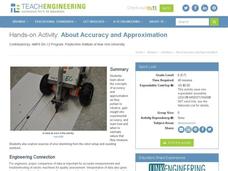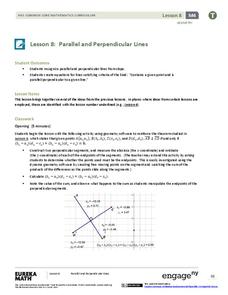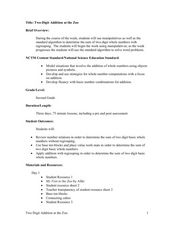Curated OER
Whole Numbers
A game is a great way to learn. Study what makes an integers, their traits, and characteristics. This lesson includes 3 separate activities intended to promote an understanding of integers, whole numbers, and opposites. The class is...
Curated OER
The Number Match Game
Kindergarteners practice matching words and symbols by playing an index card activity. They create flash cards numbered 0 to 20 and challenge each other in groups to identify the values of the numbers. Learners utilize beans or buttons...
Curated OER
Guessing Jar
In this guessing jar worksheet, 1st graders write down their guess for how many marbles are in the jar, then count and record the answer, and complete 3 sentences about the numbers.
Curated OER
How Much Has Math Changed?
Learners solve problems using the opposite, reciprocal and powers. In this algebra lesson, students solve problems with inequalities and absolute values. They show understanding of the basic content of math in this lesson.
Curated OER
Money - Using R & R to Teach Mathematics
Second graders count up coins of money that add up to one dollar. In this money lesson plan, 2nd graders also spend money and keep track of how much they have spent.
Curated OER
Numeracy Lesson Plan: Reception
Young scholars examine number sense by participating in identification activities. In this number value lesson, students practice counting from 1-10, identifying number flash cards, reading clocks and multiplying basic numbers. Young...
Curated OER
Hundredths Models
In this math worksheet, students use the hundredths models by counting the blocks as directed by the custom assignment. This could also be used to count to 100.
Curated OER
Rolling For Value
Learners participate in a lesson to comprehend the concept of probability while rolling dice. They recognize patterns while making observations and recording the data for each roll. Students also review place values while playing a game...
Curated OER
China: Dim Sum: K-1 Numeral Recognition Lesson
Students practice counting from one to twenty, identify numerals, write numerals one through twenty and match numerals to object.
Curated OER
The Price Is Right - TV Game Show
Students play variation of TV game show "The Price is Right" to identify coins and their values.
Curated OER
Coin Motion
Students recognize coins and their values and count coin groups. They play a game where when music is turned on they skip, hop, jog and when it is turned off, they go to a spot in the room marked with the same coin or value as is in...
Curated OER
Adding Tenths
Third graders pictorially represent tenths place with decimal bars and add decimals in the tenths place; students use decimal bars to represent tenths and solve simple addition problems with the tenths place.
Curated OER
Regrouping With Remediation
Fourth graders complete multiplication, addition, and subtraction problems that all contain regrouping. In this regrouping lesson plan, 4th graders complete worksheets not provided.
Curated OER
And the Number Is (Second Grade)
Second graders create Mystery Numbers. They give the class clues about the name, value, and multiples of the digits which make up the number.
Curated OER
Changing Decimals to Percents
In this online interactive activity, 5th graders change decimals to percents. They read a short explanation of the process then convert 12 decimal expressions to percent format with immediate online feedback.
Curated OER
100's Day
Students review the concepts of 100 in math class. They celebrate the 100th day of school and rotate between five stations in the class. They complete an exercise, edible, fingerprint and measuring station to celebrate 100. They share...
Curated OER
Estimate Differences
In this estimation worksheet, students solve a total of 6 word problems that involve rounding to a given place value and estimating.
Teach Engineering
About Accuracy and Approximation
How accurate are robots? Groups draw lines by moving robots backwards and forwards by one rotation of the wheels. Using the appropriate formula, they determine the percent error in the length of the lines in relation to the calculated...
EngageNY
Divisibility Tests for 3 and 9
Who knew the sum of a number's digits gives such interesting information? The 18th installment of a 21-part module has scholars investigate division by three and nine. After looking at several examples, they develop divisibility tests...
EngageNY
Rational and Irrational Numbers
Back to the basics: learning how to add numbers. The 17th installment of a 35-part module first reviews addition techniques for rational numbers, such as graphical methods (number line) and numerical methods (standard algorithm). It goes...
EngageNY
Parallel and Perpendicular Lines
Use what you know about parallel and perpendicular lines to write equations! Learners take an equation of a line and write an equation of a line that is parallel or perpendicular using slope criteria. They then solve problems to...
EngageNY
Applications of the Pythagorean Theorem
Begin seeing the world through the lens of geometry! Use the 19th installment in a 25-part module to apply the Pythagorean Theorem to solve real-world problems. Individuals sketch situations resulting in right triangles such as the...
West Contra Costa Unified School District
Shifting Linear Equations in Function Notation
Time for a shift in thinking! Learners examine translations of linear functions. They use function notation to describe the translation and make connections to the graph.
Curated OER
Two-Digit Addition at the Zoo
Your second graders explore two digit addition with regrouping. They will investigate problem solving strategies within the context of a trip to the zoo. Multiple resources and assessments are provided.







